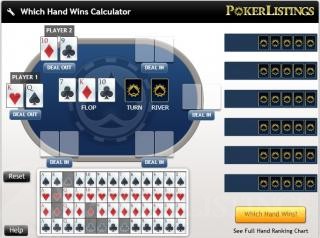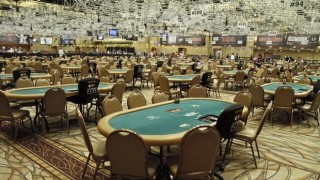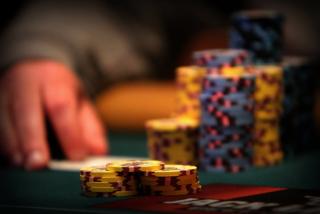title
Learn How to Play Poker - Fast!

If you want to learn how to play poker quickly, easily and profitably, you’ve come to the right place. We"ve set you up with the ultimate start-up guide to how to play poker against your friends at home or at a live or online poker room.
If you’re going to learn one just one poker game you should make it No-Limit Texas Hold’em. It’s one of the easiest poker games to learn how to play but it"s also fun, challenging and rewarding.
No-Limit Holdem is also (by far) the most popular poker game in the world so you won"t have a hard time finding people to play with!
- Fun play money app
- Available in most jurisdictions
- Incredibly easy to get in the game
How to Play No-Limit Hold’em Poker
No-Limit Hold’em, sometimes known as “Texas Hold’em,” is more than likely the poker game you"ve seen on TV and the one your friends play in their home games.

Each player at the table is dealt two cards face down. That’s it.
Each player then uses those two cards (or one or none of those cards) in combination with five shared community cards to make their best-five card poker hand.
The player with the best hand (or who gets all of the other players to fold) wins the pot! Simple as that.
There are four rounds of betting and any player can put all their chips in the middle at any time. That’s the allure of No-Limit poker. You’re always just one hand away from doubling (or tripling!) your stack but you’re also just one hand away from busting completely.
There are plenty of other great poker games but in terms of simplicity and sheer popularity, No-Limit Hold’em reigns supreme. The game’s unique blend of strategy, psychology, random chance and number crunching is virtually unmatched by any other popular game.
If you want to learn more about playing Texas Holdem specifically, check our full guide to the rules and strategy of Texas Holdem here:
- Texas Holdem Rules
- Texas Holdem Strategy for Beginners
Another good idea for getting started? Make yourself familiar with some of the most common poker terms:
- Poker Glossary | Poker Terms
How to Play a Poker Game

Before we get started some basic rules for how to play poker you should first get familiar with the basic poker hand rankings. Maybe 90% of all beginner mistakes happen when someone thinks they have the winning poker hand and they don"t.
You can consult the hand ranking guide through the link above but it’s actually pretty simple:
- Royal Flush (All the same suit, sequence A-K-Q-J-T)
- Straight Flush (Any sequence all the same suit, for instance 9-8-7-6-5)
- Four of a Kind (Four cards that are the same value, for instance A-A-A-A)
- Full House (Three of a kind AND a pair)
- Flush (All the same suit)
- Straight (A basic sequence such as 6-5-4-3-2)
- Three of a kind (Three cards that are the same value such as 5-5-5)
- Two-pair (Two pairs, such as 9-9 AND 5-5)
- Pair (Any pair whether it’s A-A or 2-2)
- High Card (Whatever your highest card is)
See? Not that hard. Do everything you can to memorize the hand rankings. Quiz yourself, repeat them 100 times or write them out. Whatever it takes. Want a secret tip? There are three hand ranking mistakes that are very frequent among amateur players.
Here are the most common misconceptions:
-- A straight beats flush (NOPE, just remember that all one suit > sequence)
-- Two-pair beats three-of-a-kind (NOPE; in poker you’d rather have three aces then two aces and two kings)
-- Overall card strength doesn’t matter but high card does (An ace-high flush is always better than a king-high flush)
Get up to $1,000 Poker Sign-Up Bonus Here!
How to Play Poker for Beginners

No-Limit Hold’em uses a standard 52-card deck even when played online. It can be played by anywhere from 2-10 players at a single table. If you have enough tables and space you can actually play with thousands of players at one time in a poker tournament format.
Here’s how a basic poker game works:
The dealer deals everyone two cards starting with the player on his left and ending on himself/herself. The player on the dealer’s left is the first player to act and they have a choice to:
- Bet (this is No-Limit Hold’em so they can bet ANY amount they want)
- Check (doing nothing basically).
If anyone decides to bet then the rest of the players have the option to:
- Call (Match the amount of the raise into the pot)
- Fold (Give up the hand and all the chips they’ve already put in the pot)
- Raise (Put even more chips into the pot)
This continues until everyone has called or all the chips are in the middle.

Once the first betting round in complete the dealer deals three cards face-up on the board. These are community cards that anyone can use. This is called the flop.
Once again everyone still in the hand gets a chance to bet and consequently raise or fold. Once that betting round is complete he dealer puts a fourth card on the table that anyone can use. This is called the turn.
Again everyone gets the chance to bet/check/raise/fold. The dealer puts a fifth card on the board that anyone can use. This is called the river. For the final time everyone gets a chance to bet/check/raise/fold.
If more than one player is still left in the hand after the final betting hand the cards are exposed and the player with the highest ranked hand wins the pot. Learn more about How to Determine the Winning Poker Hand here:
- How to Determine the Winning Poker Hand
- Which Hand Wins Calculator
Watch our quick YouTube How to Play Poker tutorial below to see how it all plays out:
What are the Blinds?

You may have heard the term "Blinds" before and they are indeed a part of No-Limit Hold’em. But they"re not as complicated as you might think.
The small blind and big blind are both relatively small bets that the two players on the direct left of the dealer are forced to put in the pot before every hand starts. You’re forced to put them in without seeing your cards meaning you are “blind.”
You can think of them as an ante if that makes it easier for you. No-Limit Hold’em features blinds to increase the action in otherwise boring hands. Otherwise players could fold every hand with no consequences, which would be a problem.
Does Everybody Just Bluff a Lot in Poker?

Bluffing is an integral part of poker (although less than you might think) but as a beginner you don’t want to mess around too much with it unless you feel particularly confident.
How come? Well you’re still learning relative hand strength which means you might not even know if you’re actually making a bluff or not. That’s not great.
There are a lot of other strategies you can work on before getting into bluffing. (We"ll walk you through some of them below).
All that said, if you really want to start dipping your feet into the art of bluffing then we suggest the semi-bluff. That means you don’t just fire bets with 2-7 offsuit but instead play hands that have the potential to hit the board and make a hand even if you"re called.
How to Play a Poker Tournament

There are two distinct forms of No-Limit Holdem poker:
- Cash Games
- Tournaments
A cash game is a poker game that has a minimum and maximum buy-in for the table and set blinds that never change. Eg. $1/$2 blinds with a $20 minimum and $200 maximum buy-in.
All players must play with only the money in front of them at the table but they can get up and leave at anytime. If a player loses all his money he or she can go get more and retake a seat at the table.
A poker tournament, on the other hand, has a set buy-in amount and all of the money players pay to play is collected into a prize pool (minus a small percentage fee for the organizers. Multiple players are used to accommodate all the players and everyone begins with the same starting stack of chips.
The blinds start small but then increase in increments over time. That forces players to make moves or they"ll run out of chips. As players lose all their chips the tables are combined until just one table remains.
The player at that table who collects all the chips from other players is the winner of the tournament. The top 10-15% of the finishing players are paid an ascending share of the prize pool (as pre-determined by the tournament organizer) with the winner collecting about 25-30% of the total.
If you want to learn more on How to Play a Poker Tournament we recommend you check our Poker Tournament pages here:
- How to Play Poker Tournaments
- Poker Tournament Strategy
How to Play Poker Better: Basic Strategy

It’s one thing to understand the basic rules of poker but to actually succeed at the game is another.
You don’t want to waste a bunch of time losing so we’ll give you a few tips that will hopefully give you an edge over the other players who are also just learning how to play poker.
We’ll cover three different levels of strategy below — beginner, intermediate and advanced — but all the tips are basic enough for starting players to understand.
How to Play Poker - Beginner Tips
Here’s the best poker tip you’re going to get so listen closely: Don"t play very many hands!
You should only be playing 18-20% of the hands at a standard nine-handed table. You generally want to be playing good hands when you are just starting out.

But what are good hands? You can start with 9-9, T-T, J-J, Q-Q, K-K, A-A and A-J, A-Q and A-K. You can loosen up that range if you’re playing against less than eight other opponents.
Also: Try to avoid calling a lot. The call is one of the poker newbie’s favorite plays. It’s easy to understand why: New players aren’t sure what they actually have and whether it’s any good.
Rookie poker players would rather call than bet because they don’t want to risk even more on what might not be as strong a hand as they originally thought.
Here’s the thing about poker, however: Betting is much stronger than calling. How come? You can win a pot without showing your cards by betting. You can’t do the same thing by calling. It’s that simple.
Furthermore experienced poker players will take beginner poker players for a ride. Once an experienced poker player finds a good hand they’ll simply bet a moderate amount on every street as the rookie pays them off on every street.
For all these reasons it’s worth putting in a bet or re-raise in even if you don’t feel completely comfortable doing it.
Don’t Get Embarrassed if You Lose a Hand!
Poker has a way of making even the most experienced players look absolutely silly. It’s just the nature of the game. You’re going to get caught with the worst hand. You’re going to lose big pots. You’re going to misplay your hand.
Sometimes when you’re learning that can lead to serious “Feels bad, man” moments. Don’t sweat it. Just keeping playing and working on your game. It will take some time to get the hang of it.
Read our complete How Not to Suck at Poker series for Beginners starting here:
- How Not to Suck at Poker: Play Fewer Hands
Play for Free on PokerStars to Learn the Ropes!
Intermediate How to Play Poker Tips
Without knowing the context of a hand you can’t arbitrarily say what hand is going to win but there are hands that tend to win more than others.
Say you have pocket fives. The flop comes A-8-5. This is pretty much an ideal flop because your hand strength is very concealed. People are going to have a very hard time putting you on that exact hand and they may have even flopped a big pair of aces.
You can make the same argument about straights and full houses. On the other hand there are hands that are difficult to conceal. If you’ve got trip fives (that’s one five in your hand and two on the board) then a lot of people are going to expect three-of-a-kind.
Same thing goes for flushes, which are very easy for even beginners to identify (although you might catch someone with a lower flush, which is great).
Position is Very Important in Poker!

What’s position, you ask? That’s the order in which players are forced to bet/check. After the flop the order always starts with the player on the left of the dealer.
Generally it’s always best to go last because you get to see what everyone else in front of you is going to do. Here are the four biggest reasons to play in position:
Four Biggest Reasons to Play in Position:
- When it"s your turn to act, you have more information than your opponents.
- Position gives you "bluff equity," meaning simple, cheap and effective bluffing opportunities.
- Acting last lets you make more accurate value bets.
- Having last action gives you control over the final pot size.
That means you might want to make a few more bets when the dealer’s button is in front of you since everyone else will have to go before you after the flop. Read more about position here:
- How Not to Suck at Poker: Play in Position
Some more basic poker pointers:
Don’t Get Too Attached to Good Hands -- Pocket kings and pocket queens are very strong hands. The fact remains, however, that an ace on the flop can spell doom for you if you’re holding them.
An ace on the flop doesn’t necessarily mean the end for kings or queens but you should at the very least be cautious. Furthermore if the board has tons of flush cards or straight cards you should be wary no matter what your pocket hand is.
Be Very Careful When Playing Ace-Queen -- You know how we said that sets and straights are fantastic because their value is concealed? Ace-queen is kind of the opposite in that it looks good but it tends to be a huge loser in an inexperienced players hands.
It is singlehandedly the biggest trouble hand in poker (with pocket jacks as a close second). Why is ace-queen so bad? It just tends to happen that in really big pots ace-queen is a big loser.
Ace-queen gets dominated by ace-king when an ace lands on the flop and it can also fall prey to two-pair type hands quite easily. Pocket jacks are also a troubling hand but they have much more value if you manage to get a flop with no overcards (aces, kings or queens).
Advanced How to Play Poker Tips
Play the player. Once you have the fundamentals down you should start to pay close attention to your opponents. You might be surprised to learn that a large amount of poker reads don’t come from subtle physical poker “tells” (such as scratching your nose, or playing nervously with your chips) but instead from patterns.
If a player is betting all the time then the chances are they are playing some pretty crappy cards. Similarly if a player folds all the time then you can make the assumption they are only playing fairly strong hands. This is very simplified but’s the basis behind reading other players, which is a pivotal part of poker.
Learn Some Basic Poker Odds -- Poker involves math. You don’t have to be a numbers genius to improve your game however.

Just understanding the basic odds behind hitting certain hands can be very beneficial for people just starting out.
Here’s a really simple one for you: 221-1. That’s the odds of getting pocket aces. That means statistically you’ll only get aces on average every 221 hands. Puts things in perspective doesn’t it?
Here’s a guide to some of the most common odds you’ll run into in online poker or live poker:
- Being dealt a pair — 17-1 (5.9%)
- Being dealt aces — 221-1 (0.45%)
- Being dealt ace-king suited — 331-1 (0.3%)
- Flopping a set with a pocket pair — 8.5-1 (11.76%)
- Flopping two-pair (without a pocket pair) — 48-1 (2.02%)
- Making a flush by the river (flopped four of one suit) — 1.9-1 (35%)
- Making an open-ended straight by the river — 2.2-1 (32%)
- A full house by the river (flopped three-of-a-kind) — 2-1 (33%)
Check Out the Best Poker Sites Here
How to Play Poker Online for Real Money
So now you understand hand rankings and the basic game-play behind poker. What’s the next step? Playing some hands! There’s no quicker way to get up to speed than playing a bunch of hands in a low-stress environment. That is where online poker comes in. Heck, online poker sites even post your blinds for you!

You could wait until you have all your friends around for a home game but that might take some time and there’s a good chance play will move incredibly slow.
Instead a really great option is just signing up for a poker account online or downloading a free poker app. Most major poker sites have great play money apps and their software is superb.
The idea is to just play a bunch of hands and get comfortable with the flow of the game. You may get confused by a few things at first but the apps never make mistakes so you know the pot is going to the right player. Once you’re comfortable you’ll probably want to retire the play-money app because people play very differently when they aren’t playing for money.
The best way to start playing is to get informed about the best online poker rooms that you can sign-up for. Here at Pokerlistings we pride ourselves on having the highest poker sign-up bonuses for online poker players so take advantage and sign-up through our links!
Our top recommendation for playing poker on your desktop or mobile device is 888 Poker. You can see what we think about 888 by reading our review HERE.
If you"re looking for a very good free poker app alternative to play on your tablet or phone our recommendation is definitely Appeak Poker. Try out for free on your mobile device or play directly on Facebook!
How to Play Poker at a Casino

If you"re more interested in playing poker in a live setting (meaning with real people and an actual dealer), there are numerous casinos and card rooms around the country (and the world) waiting for you.
You of course have to be of the legal age where you live to play but walking into a real, live poker room can be one of the most life-changing and stimulating experiences ever!
If you"ve never done it before it can be a bit intimidating so we"ve put together an easy guide with a few tips for your first time playing poker at a casino. Read it here:
- 14 Essential Tips for Your First Time Playing Poker at a Casino
How to Play Poker with Chips
As you"ll find out pretty quickly on your poker journey the fine details of the game really matter. And not just when it comes to poker strategy. There are countless subtle nuances - from the way you hold your cards and count your chips to the way you move a bet into the pot - that separate the pros from the amateurs.
Before you even sit down at a poker table it can really help your confidence and your nerves to have what we call the "poker basics" down to a T. Below you"ll find 9 videos outlining some of the fundamental basics of poker every new player should get comfortable with. It"ll make all the difference in the world!
1) How to Stack Your Chips Like a Pro
If you"re playing live poker, how you stack your chips at the table is an immediate tip off to your level of experience. Those who play regularly stack their chips in a distinct way to improve the speed of play and make bigger decisions easier. Here"s how to do it:
2) How to Hold Your Cards Like a Pro
How you hold your cards is also a pretty clear tip-off to your experience level. Not that it"s a bad thing to tip your hand as an amateur, but holding your cards in the right way can help you from revealing what you have to more perceptive players around the table.
Trust us; you"ll feel much better when you know your hole cards are a mystery to everyone else.
3) How to Bet and Raise Like a Poker Pro
The next step after stacking your chips and holding your cards? Getting some of those chips into the pot. As you"ll find out often in poker, how you do something can be as important as how much you"re putting in. Watch below for the way the pros do it:
4) Poker Hand Rankings and Values Explained
Pretty self-explanatory; if you want to win some pots it"s a good idea to know what you got.
5) How to Read the Board and Which Hand Wins
Once you know how poker hands are ranked and valued you"ll need to know how to put your best hand together. Likewise knowing exactly hands wins can also be tricky for beginners, but here are some simple tips for making it clear and easy.
6) How to Shuffle Poker Chips Like a Pro
Ever walked into a casino poker room during a major tournament? That all-encompassing clicking sound you hear is from hundreds of players simultaneously shuffling their chips - part habit, part time killer and part pure poker flair.
Once you"ve played poker for awhile the sound will be as comforting as a sounds of nature CD. Here"s how you do it:
7) How to Count Your Chips Like a Pro
Counting your chips ... that"s pretty idiot proof, no? Everyone can count can"t they? It is once you"ve learned this simple shortcut specific to poker tables.
8) How to Host the Perfect Home Poker Game
Not that you"ve got all the poker basics under your belt, invite your friends over and get right into it. Here are a few simple tips to help your game run a lot smoother:
9) How to Shuffle Cards Like a Pro
One last tip: When it"s your turn to be the dealer, here"s how you make it look and feel completely professional.
Enjoy your newfound love of poker! We hope it"s a long and fruitful journey.
How to Play Poker at Home
If you"re more of a homebody and would prefer to invite your friends over for a classic home poker game we"ve got you covered there, too.
Check our full 12-part How to Host the Perfect Poker Home Game below starting with:
- How to Host the Perfect Poker Home Game: Chips & Cards














Source
Daftar Judi Online
ReplyDeleteBandarqq Online
Bandar Q Online